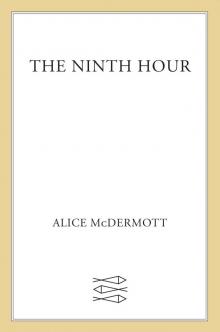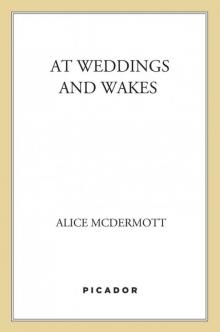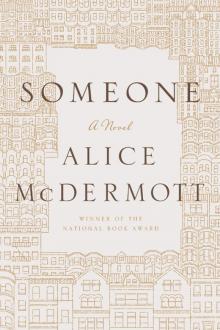- Home
- Alice McDermott
A Bigamist's Daughter Page 16
A Bigamist's Daughter Read online
Page 16
They cower and shrug.
She picks up the receiver. The board has been flung wide open. There’s an oozing tube of Blixtex beside it. She punches buttons, passes a few calls through. Disconnects a few more. The mouthpiece smells like sulfur. “Vista Books, good afternoon.” Dead air. Punches another button. “Vista Books, good afternoon.” For Marv. “Vista Books. Ms. Connelly is in conference right now. May I take a message?” As she copies the number, she notices the poem, on the wall above the switchboard, below the reception window, carefully flattened and framed in tape.
Vista, vision of all my dreams,
From your summit, I view my heart’s desires.
Through you, I silence all my midnight screams
And quench the hopes that come of earthly fires.
No more for me the pain that longing brings,
Only the peace that suffering inspires.
Through you, I rise, as if on angel’s wings,
And know my poor heart, though set apart,
Now laughs again and sings!
Someone behind her says Bonnie is in the bathroom and won’t come out. Someone else is laughing.
Chapter 12
She was not sure what woke her that morning: a dream, the low rumble of a truck driving past their house, her father’s voice, muffled, low. Maybe when her father was home, she always slept lightly, slept listening.
But whatever the reason, she tells him, she woke that morning when her room was pale gray and the door and the furniture—even the foot of her own bed—a darker, shapeless gray, and heard her father’s voice. He seemed to be asking a series of dull questions, his voice unmodulated until the end of each phrase, when it rose a little and then paused. Perhaps for her mother to answer. She heard him laugh once and then begin the series of questioning phrases again, a faint drumming of sounds, and she may have fallen asleep concentrating on the rhythm of them.
If she did sleep, she woke again to the sound of a door, or maybe just the creak of the stairs. A car drove by outside. The room was still dim. She knew he was leaving again.
Suddenly, she was up, in the dark hallway, running down the stairs. She punched through the coats in the hall closet, pulling them from their hangers until she finally found her pale-blue ski jacket. She slipped her feet into the rubber boots she found at the bottom of the closet and pulled open the front door. It must have been very early; the air was sharp.
She ran down the steps to the garage, sure she would see him there. But the garage door was closed.
She then ran to the corner, expecting now to see him just halfway down the block, on foot, his back to her, but there was only the gray lawns, the silent houses. She ran farther. Her rubber boots stuck to the bottom of her feet and made a hollow sound against the sidewalk. Her coat was open and she began to perspire under her pajamas. In one corner of the sky, just above the chimneys and TV antennas, there was a pale bit of pink, flesh-colored, like a tear in gray flannel. The houses lining the street seemed flat and blind.
At the next corner, a weak outdoor light glowed at the end of someone’s driveway, growing dimmer as she watched it. The sidewalk, narrow and bone-pale, seemed to go on forever, and she was sure that somewhere on it, up ahead, she would turn a corner and see her father’s back, walking slowly away from her.
She decided to go after him.
But then, across the street, a front door opened, a bald man in a white T-shirt peered out, scratching his stomach, and turned away. A light went on in his living room, behind white blinds and gauze curtains. She turned and walked home, her boots slapping foolishly against her bare ankles.
He pours more wine into her glass, watching her. “That’s interesting,” he says lightly, treading carefully. “Probably significant.”
She lifts her glass, holds it before her chin. “When I got home, my father was in the shower. I could hear him singing. My mother was asleep in the middle of their bed.”
She smiles at him but he smiles back with only one side of his mouth, and she suddenly feels like a woman in a low-cut dress, leaning playfully, straightening up just in time. He hadn’t asked her to talk about her father. They’d merely been exchanging childhood anecdotes and she’d told him how she woke, heard her father’s voice, as if it were one of them. As if she didn’t know it would lead to this. “So it’s not significant at all. He hadn’t gone anywhere. They probably just woke up and made love. Like any normal couple.”
He sips his wine. They are in a small restaurant named after a romantic cliché. Each tiny table is partially surrounded by Oriental screens or curtains of long black beads, lit only by a candle-shaped bulb and the red lights of the entrance and exit signs. Like a subdivided brothel, she’d said. He’d called it a place where they could talk.
“It still has significance,” he says now, in a tone he might use to tell the bending and straightening woman, I saw them anyway. “You chased after him. You wanted to go with him.”
She shrugs. Behind him, through a veil of beads, she can see the profile of another couple bent over their electric flame, foreheads nearly touching. They make her think of scientists, Pierre and Marie Curie looking for radium. She hears a woman’s voice behind her saying, “You don’t know how I react to him.”
“Sometimes I think the whole thing was a dream,” she tells Tupper. “It doesn’t make sense that I could have left the house like that without my parents hearing.” Scarlett O’Hara, Bill had said when she told him the story. He’d pointed out that Scarlett O’Hara also ran after someone—although through fog, not at dawn—at the end of Gone With the Wind, and that scene, more than anything else, was probably the source of her own recollections. He’d said she often had trouble distinguishing what she’d seen and read from what she’d actually experienced. As if she’d ever seen or read anything that could have turned that monotonous neighborhood into the frightening, fantastic place it had seemed to her that morning.
“Even if it is a dream,” Tupper says, cutting a piece of cheese from the board between them. “It’s significant.”
She laughs. Behind her, the man is saying, “But if you’d stayed with him, you wouldn’t have come to New York. We wouldn’t have met.”
The woman says, “We’d have met. Sooner or later.”
Elizabeth thinks of Reverend Datz: It was not mere coincidence.
“What about your mother?” Tupper Daniels asks, leaning back and hooking his finger in his belt like a country lawyer. “Was it hard on her, your father being away so much?”
She picks up a cracker and bites one tiny corner, not for the taste, but the gesture, like an actress in a soap opera who must have her mouth clear for lines. “We were both used to it,” she says. “It was no big deal.”
He leans forward, puts his hand under his chin. “She cried like a wife for a husband,” he says in his recitation voice. “Like part of some lugubrious tradition. Like women at train stations and airports, on docks and balconies and homely porches. Women crying with hands raised and a particular name on their lips, although before them there is only the curving earth or sea, the general, ubiquitous mist.” He winks. “Chapter Fifteen.”
She studies her glass.
“I’m learning when to change the subject,” he says finally. “You get kind of arrogant and pouty, like you’ve got a wonderful secret and you’re afraid no one’s going to ask you to tell it.”
She smiles, shrugs, wonders if it’s true.
“So I’ll change the subject,” he says. “Tell me something else about your past. Tell me about your lovers. All your other lovers.”
She raises her eyebrows at the other, but knows there is no sense denying it. They are lovers now, just like all the other couples in this tacky, overpriced restaurant (“Come in and fall in love,” says a sign in a glass case by the door, where other restaurants might suggest, “Come in and try our roast duck”), just like all the other lovers, leaning over small lights, peering into each other, searching for the significant, the special, the glo
wing, never-before-seen compound buried in all that grimy, indistinguishable pitchblende.
Tell me about your parents, your childhood, your other lovers. Tell me how you came to be mine. For it was no coincidence.
It occurs to her that what lovers do for each other, Vista does for each author: passes through their dull lives and comes out crying Eureka! There is meaning, there is an equation!
She looks at his blue eyes lit by the yellow bulb. They’re nice eyes, but then most eyes are.
“Faces without eyes,” she tells him, “would all look alike. Like potatoes. Or rocks.”
“Or clay before the sculptor gets to it.”
“Or elbows.”
He laughs, reaches for her hand. “Tell me about your other lovers,” he says again. “I want to know everything about you.”
Behind him, Pierre and Marie have their fingers on each other’s faces. Blind men trying to recognize a stranger.
“In my memory,” she says. “They’re all a bunch of elbows.”
He sighs. “You’re being evasive. You’re a very evasive person, Elizabeth. You’re full of secrets.”
She bows her head as if he has complimented some small exquisite detail of her dress. How good of you to notice.
When she went to the bathroom to get Bonnie, she had felt an odd, Hitchcock kind of trepidation. She felt it was very possible that she’d open the door and see dangling legs, the shadow of a rope. Or Bonnie crouched upon the sinks, chattering in a man’s voice.
But she was merely washing her hands and idly studying her cold sore in the mirror.
“There’s no one at the board,” Elizabeth said, trying to sound pleasant. Suzanne, the office manager, was supposed to handle these things. She could yell at Bonnie when she got back from the dentist.
“No?” Bonnie said, pumping more slimy green soap into her palm, creating another lather.
“No,” Elizabeth said. She noticed that the girl was leaning her stomach against the sink, getting her blouse wet. She walked past her, into one of the cubicles, hoping that when she came out, Bonnie would be gone and back at her post.
The cubicle had that close, human smell. The seat was warm. She tried not to think of Bonnie sitting there, and found herself thinking instead of what Bonnie, surely a virgin, must look like inside: matted, gummy? The pubic hairs woven into a coarse, impenetrable net? Or fine, untouched, as fresh and moist as the core of a peach?
She pushed the imagining away. She’d been undressing people all afternoon.
When she came out of the toilet, Bonnie was still there, washing her hands. Elizabeth washed hers too and then, taking a coarse sheet of paper towel, said, “I closed all the lines for you. But you’d better get out there.”
Bonnie turned to look at her and then turned off the water and shook her hands.
“You don’t have a boyfriend, do you?” she said, eyeing her.
Elizabeth laughed, startled. She had an impulse to lie. “No,” she said. “I don’t.”
Bonnie reached for a towel, dried her hands, and then held the crumpled paper, just as Elizabeth was holding hers.
“I don’t either,” she said, shrugging, raising her chin to show she didn’t care. The tiny grosgrain ribbon tied into a bow at the neck of her blouse seemed ridiculous under her large face. Like a butterfly on a bulldog. Her small eyes, brown and set close, seemed to poke at Elizabeth’s clothes and hair.
She leaned forward to throw her towel in the basket. Bonnie followed.
“What kind of make-up do you use?” the girl asked, trying to seem casual.
Elizabeth moved to the door. “Revlon.”
“I use Maybelline,” Bonnie said. She seemed intent on this girl-talk burlesque.
Elizabeth put her hand to the door. “You’d better get out there,” she said.
“What else do you do?” Bonnie asked, quickly following after her, raising her own hand to the door, or to Elizabeth’s face. “Besides work here? What do you do? Like on weekends?”
Elizabeth pushed the door open. Laughed. “Not much.”
“Me neither.” Her face came closer, the lips swollen, blurred with salve. “I’ve worked here for as long as you have.” She seemed to smile.
“There’s no one at the board,” Elizabeth told her again.
“If you could show me what to do, I could probably do it too. I could be an assistant editor. I wouldn’t get depressed. I could handle these creeps just like you do.”
Elizabeth smiled. “We’ll see.” Stepped through the door and heard it swing closed behind her. Heard it swing open again.
Bonnie was on her heels. “I’ve watched you,” she said. “Please. I could do it too, just like you do. Please.”
Elizabeth turned a corner, took the long way back to her office. “We’ll see,” she said over her shoulder. And behind her she heard Bonnie cry, “I’m as good as you.”
“I’m beginning to put you together,” he whispers, later that night, when they are lying in the orange-tinted darkness of her room.
She is drifting to sleep, her mind mechanically reciting Congratulations letters, her limbs tired, her pulse dragging after the slow movement of his fingers. She feels she needs to be put together.
“You’re a pseudocynic. A hesitant daredevil. You run to the water’s edge and run back, the same way you ran after your father and then ran back.”
She feels her pulse quicken although his hand is still.
“You want to pretend your father was just an ordinary man with a job that made him travel, but inside you believe something else.”
She keeps her eyes closed, keeps silent.
“You want to say the past doesn’t mean anything, except to romantic Southerners, and yet you know otherwise. You remember the past vividly.”
Her body is tense. It is sexual, sensual, this slow unveiling, slow revealing. This strange man unraveling her life like a gypsy fortuneteller, an ancient oracle, giving it meaning, coating it with gold light. And what else do you see? What other wondrous thing am I? What wondrous thing that poor souls like Bonnie would fear to aspire to, if they only knew the truth? That women like Ann, if they only knew, would long to become.
“You think you’re tough,” he says. “The hard-boiled editor. But inside, you just want love. Like everyone else.”
She moves her head into her pillow, smiles, turns it into a laugh. Put me together and I’m just like everyone else. She laughs, softly, breathlessly, as if she has swallowed too much common air.
Misunderstanding, he comforts her.
Chapter 13
All her other lovers.
God was first, of course. He was Zeus, Merlin, the Handsome Prince in all her fairy tales. Every night, her mother would read to her from a book called Lives of the Saints, concentrating—as she herself would do when she learned to read—on the female saints, not because they were to provide her with role models (her mother would have known nothing of the term), but because their stories were so much more romantic and dramatic than the males’. Because the woman saints were so much more given to grand gestures and heartbreaking miracles, to throwing themselves at the feet of the Lord—the quintessential Lover, Father, Husband, Knight.
There was the story of young Saint Agnes, a mere child, whom the Romans tried three times to burn at the stake, but whose lovely skin God would not allow to be harmed. (Eventually, they chopped off her head, her complexion preserved.)
There was Saint Lucy, so adamant about saving herself for the Lord that she plucked out her eyes and handed them to the young prince who, while trying to seduce her, had told her they were beautiful.
There was Saint Theresa of the Little Flower, a young orphan raised in a convent who wanted so much to receive the body and blood of Christ in Holy Communion, that God, like an indulgent father, ignored the opinion of the humorless nuns who felt she was still too young to receive and made a floating host appear before her during mass. A girl whose body was rained with rose petals from heaven when she died.
And then, of course, there was her patron saint, Elizabeth, the cousin of Mary and the mother of John the Baptist, who conceived her son in her old age, not with the help of her husband, the priest Zachariah (who, having doubted God’s word, was struck dumb throughout her pregnancy), but through the will of God himself.
The story goes that Mary, after hearing that she was to be the mother of Jesus, packed her bags and went to visit Elizabeth, who was six months pregnant herself. There was a painting in the vestibule of the Connelly’s parish church, St. Elizabeth’s, depicting the scene: Mary, young and blond, in her perennial blue robes, greeting the gray-haired (and still slim) Elizabeth outside her home in Judaea. Elizabeth is reaching out to touch Mary’s arm, and Mary is smiling, her eyes and one white hand raised toward heaven, the other reaching for Elizabeth. The skirts of their long robes are spread out and seem to be rustling, as if the two women had run toward each other, and Mary’s pale, sandaled foot peaks out from under her hem. Both women have golden haloes around their heads and their faces are bright, beautiful.
Under the picture, in a yellowing glass frame, were the words of their greeting: Elizabeth’s, “Blessed art thou among women,” and Mary’s, “My soul doth magnify the Lord. And my spirit hath rejoiced in God my Saviour … for behold from henceforth all generations shall call me blessed. Because he that is mighty hath done great things to me.”
It was for her the most romantic, most human, even most miraculous scene in the Bible: The young virgin and the old barren woman rejoicing in their pregnancies, and God alone—God the Prince, Father, Husband, Lover, Knight, was its sponsor. Elizabeth’s husband after all was old, struck speechless, lacking even the imagination to accept the miracle without question or doubt. Mary’s fiancé was puzzled, unsure, back home in Nazareth with his wood and his tools. One a mere priest, one a mere carpenter. No match for the virile God whose will alone could fill their wombs: The God who was the hero of all her dreams and fairy tales and prayers throughout the first decade of her life; through the years when she, as every Catholic schoolgirl must at some time do, planned to be a nun and played at being a mother.

 A Bigamist's Daughter
A Bigamist's Daughter Child of My Heart
Child of My Heart The Ninth Hour
The Ninth Hour At Weddings and Wakes
At Weddings and Wakes After This
After This That Night
That Night Charming Billy
Charming Billy Someone
Someone